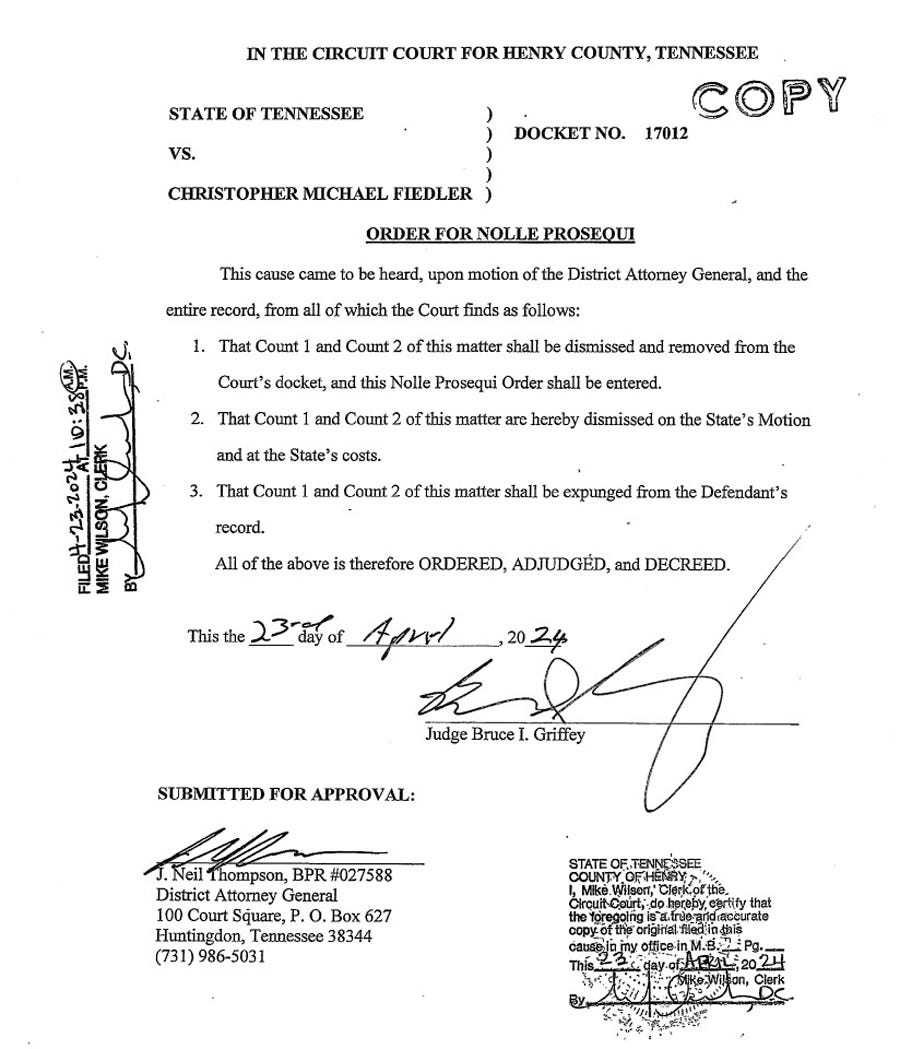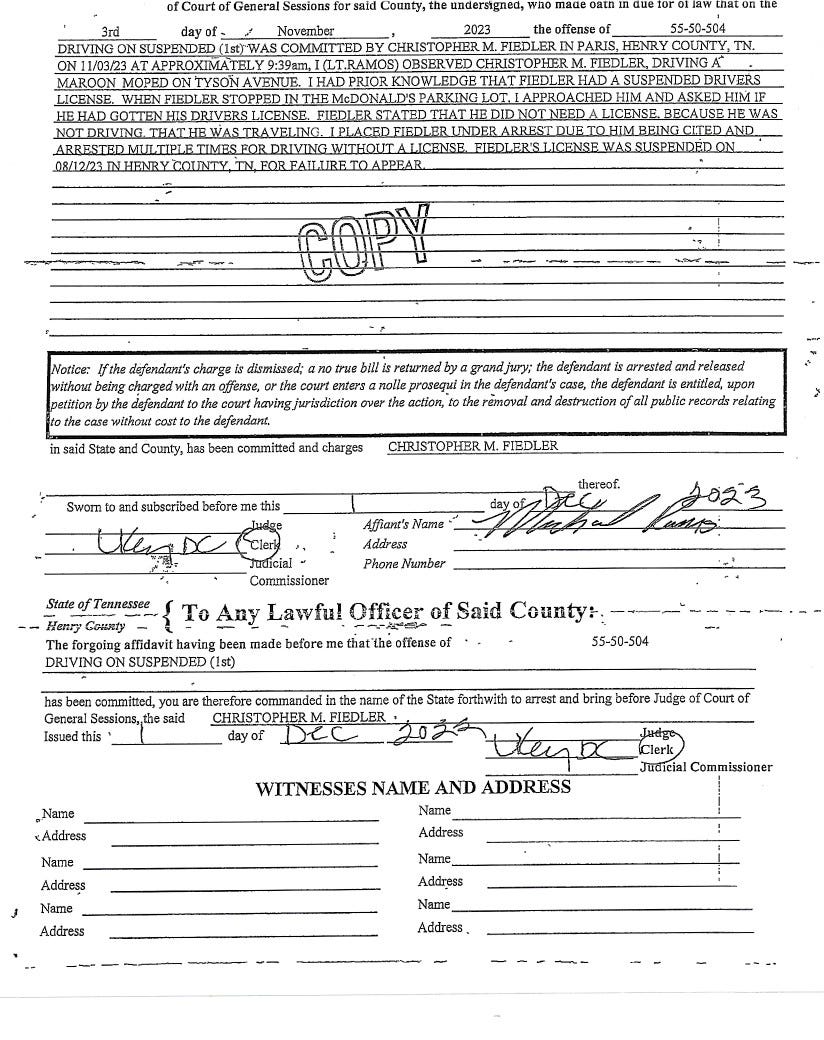Town holds traveler 34 days under illegal no hearing, no bond rule created by TN court system
Paris, Tenn., keeps charging Fiedler with 'driving' offenses without showing he uses roads for commercial, for-hire purposes

Tuesday, April 24, 2024 — A fast-food cook held in a $50 traffic case in a small town’s grandiose jail 34 days without bond is free after demanding a hearing denied him under an illegal Tennessee court rule.
By David Tulis / NoogaRadio Network
“Get your things together, you’re leaving,” Henry County deputies tell Chris Fiedler three times before he believes them in Paris, Tenn., the former inmate says.
Mr. Fiedler was arrested under a bench warrant March 20, 2024, for failing to appear in Henry County circuit court after having been indicted on the charge of “operating a vehicle without a license.” Court records indicate he had no notice of the indictment and no notice of arraignment. A clerk serving court clerk Mike Wilson inked the “capias / bench warrant.”
Efforts Friday to reach district attorney J. Neal Thompson as to what prompted Mr. Fiedler’s release and police chief Ricky Watson as to the conduct of his department’s employees were not successful.

The Tennessee supreme court’s rule appears to violate a constitutional protection of the right to bond. “Appearance Upon an Arrest. Any person arrested — except upon a capias pursuant to an indictment or presentment — shall be taken without unnecessary delay before the nearest appropriate magistrate of: (A) the county from which the arrest warrant issued *** ” Rule of criminal procedure Rule 5 (emphasis added). Tennessee’s bill of rights in art. 1, sect. 15, says “That all prisoners shall be bailable by sufficient sureties, unless for capital offences, when the proof is evident, or the presumption great ***, ” and, further, that “excessive bail shall not be required, nor excessive fines imposed, sect. 16 (emphasis added).
The traffic citations law says no party can be forced to post bond for more than the fine.
(b) Any person arrested and charged with violating [Title 55 motor vehicle provisions] who is taken before a magistrate or judge *** shall be admitted to bail by posting a cash bond, but in no case shall the cash bond exceed the maximum fine and costs for the offense or offenses for which the defendant is charged.
Tenn. Code Ann. § 55-10-203 (emphasis added)
Judges issue capias warrants for people who fail to show up for a hearing. But in Henry County the problem appears to be that people are lost in the jail and have to wait until the next preliminary hearing scheduled date.
Massive numbers of “no bonds”
Henry County’s docket list for arraignments March 18, 2024, shows 27 people ordered held without bond, none of them on charges of murder.
That could be 30 days or 60 days. No hearing. No bond. The machinery in this Midwestern Tennessee town violates Tenn. const. Art. 1, sect. 7 guarantee that anyone except a murder defendant is able to have a bond hearing and be freed pending adjudication.
‘We just wanted to let you know, Mr. Fiedler, you are being heard,” he says a clerk told him in a hallway as he made the rounds to obtain all documents in his case.
Nearly 30 days into his jailing, Mr. Fiedler began demanding his right to a bail hearing. Two days later, Sheriff Josh Frey, whose department runs the 204-bed unit built in 2001, released him.

“I said I feel like I’m not being heard because just a few hours ago Mr. Ramos pulled me over. I feel more than just harassed. I don’t have a lot of money. He’s already taken my property, and if my wife asks me to get a gallon of milk tonight or tomorrow, I will. But he threatened me, and I feel more than threatened.’”
Mr. Fiedler is concerned that local officials will destroy records of the case under the expungement rule that allows records of certain offenses to be deleted once a case is dismissed. Mr. Fiedler says he did not request expungement, “No, she offered, she said that on her own” about expungement.
The case highlights a problem across many towns and cities in the US, where slack care about obeying state law and constitutional exigencies allow for persistent abuse and a disregard for the rights of the accused.
Particularly egregious in Mr. Fiedler’s case is clear law that recognizes private ingress and egress from his house and the rights of communication and assembly and many other rights implied in movement outside the state privilege. Tenn. Code Ann. Ttiles 55, motor and other vehicles, and 65, chapter 15, carriers, regulate commerce. But they give no state actor at any level power to abrogate the right of free movement by car or any other type conveyance if for private purposes, pleasure or the exercise of rights.
These are the regulatory bodies of law upon commerce, traffic and transportation. Mr. Fiedler says his maltreatment and denial of his rights will prompt him immediately to file with the city attorney Tennessee transportation administrative notice first served upon public bodies in February 2018 starting in Chattanooga and Hamilton County, in the Southeastern corner of the state.
Mr. Fiedler, born October 1955, has long held the belief that he has a right to travel. Records indicate the two dismissed counts against him are the fifth and sixth criminal claims made against his use of his scooter apart from commerce at hands of a city police department run by chief Ricky Watson.
The judicial branch of government long has connived with the other two branches to abrograte communication rights by travel, and here to abrogate the right to a bond hearing. State law forbids the courts from crafting rules violating rights.
The rules prescribed by the supreme court pursuant to § 16-3-402 shall not abridge, enlarge or modify any substantive right, and shall be consistent with the constitutions of the United States and Tennessee.
Tenn. Code Ann. § 16-3-403
But the court system, as carelessly as officer Ramos, follows its own rules and is able to cite state law to justify doing so.
After the [court] rules have become effective, all laws in conflict with the rules shall be of no further force or effect.
Tenn. Code Ann. § 16-3-406





